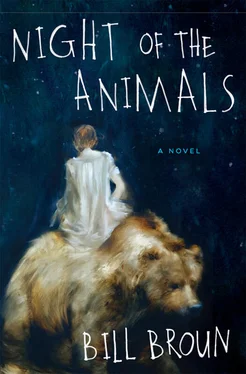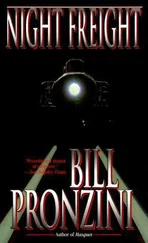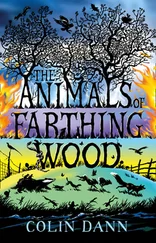Some of the diplomatic cops in the Roost were astir.
“Shit! Look, shitheads,” one of them was saying. “It’s that goddamned monkey.”
“Not a monkey, dumbass,” said another. “Ape.”
Mason had also seen flashes of the gorilla’s face, and the humped, retreating backside of an elephant, and the giant legs of elephants, and now the gorilla again, with a strange, pained expression, looking right into one lens. There was another animal, too, but it was harder to make out — a tiger? No one had said anything about tigers.
The gorilla’s face came up again on several screens, but Astrid seemed to vanish.
“Britain’s under attack — by its own zoo? But now I don’t see the woman — this Inspector Sullivan,” said Mason. “We’ve got lots of gorilla.” The animal looked sad and frighteningly sentient.
“Nope. Not a face we’re going to find on the databases,” he said, turning to a square-faced black rookie agent from Baltimore who was manning the master CCTV console. Mason really liked this rookie, Navas, an agent who also had strong empathic skills (it was getting to be a trend in FBI and CIA recruitment). But Navas wasn’t exactly trained in using them, and for Mason, that made him far more trustworthy.
Navas smiled and shook his head, then asked in a serious tone, “What about the woman?”
“I think we’re sort of stuck,” said Mason. “I don’t actually see how her presence rises beyond a UK internal security matter. But I’m still thinking we’ve not seen the end of this. I hope she’s OK. I see no threat with her . I just don’t — but, for now, I think we’ve got to leave her to the fucking Watch. Damn shame.” He hesitated for a moment, then turned back toward the squinty-eye Cog.
“Is she or is she not a threat to America?” Mason asked the Cog.
“I don’t. think so?”
“OK,” said Mason. “But the Crown doesn’t like her.”
“Good ’ole King Harry,” Navas muttered. “If he’s after her, she must be competent.”
“Damn right,” Mason said, leaning down toward him.
“Heh-heh,” said Navas, smiling awkwardly. Several of the CCTV monitors were swinging wildly in a way that made it impossible to see what they were recording. “My concentration’s shit,” said Navas. “I’m losing focus. I’m feeling like there’s something in the chancery building. Sir?”
Mason took a deep breath. He said, “What do you mean?” He glanced over at the Cog, frowning.
“What do you say, Cog?”
“I don’t know. I notice. something, too? Something’s in my thoughts. Something’s in here.”
“What the fuck do you mean, ‘in here’?”
“I don’t know. I think. my thinking’s. it’s like it’s sort of rippled, sir.”
Mason looked over toward the group of newcomers who had come in with the pass-phrase.
It could be nothing, Mason knew, but a Cog’s distraction usually meant trouble. For all his dislike of Cogs, he recognized that they possessed a talent. They would clamp onto others’ minds like sharks and never let go.
“OK,” said Mason. “Let’s sweep the building.” He nodded to one of the few actual armed U.S. Marines who stood guard in the Roost. “See if there’s anyone in the building who’s not on crew — or authorized.”
“The woman,” said Navas. “We should help her. We have to.”
“Maybe,” said Mason. “It’s complicated. Is there a valid, concrete threat? Where are these. animals?”
Navas spun around, back to his console, and worked his cameras. A blur of images from the square — sycamore leaves, black bollards, mullioned windows — flashed across the screens. Finally, two big shots, at separate angles, of an exhausted pachyderm appeared on the main CCM screen, its trunk held rigidly out like a visible bolt of anger.
“OK, sir. Got one. It’s outside, ” he said, with a sigh of relief.
“Fuckinay,” said Mason. “This is — goddangit — it’s England, isn’t it? That’s what this is all about. Y’all think? Why does this kind of shit always happen here?” He leaned in to look at the screens more closely. “Anybody read War of the Worlds ? Typical Englishness.”
A different, boyish agent turned around, about to speak.
Mason interrupted him, “That was rhetorical.”
It seemed to him now that the newcomers — austere-looking goobers with ultrashort haircuts as tidy as helmets — were crowding around the screens. Where did all these folks come from? Mason wondered. Few wore the dark bland wool suits and ties of his agents. Mason didn’t want to overthink their presence; one of the hassles you learned to tolerate in security around the Company was being monitored and visited by shadowy, parallel organizations within the service. (And the pass-phrases were redundantly protected and knowledge of them sacrosanct.) But Mason felt nervous. He noticed that many of the kooks also wore the same white Nike trainers. They were in one of the most secure rooms in London, six floors below the surface (not the commonly believed three), encased in a full ten-foot-thick socket of lead and steel-buttressed well-being. They could survive a direct hit from most hydrogen bombs — for a few hours, at least. Apart from the mysterious newcomers, they all adored Mason. He was cantankerous and popular, and he inspired loyalty. But something was slipping past him.
“Seriously,” he suddenly announced to all, “the pressure’s sort of off on you all.” Not everyone turned around to listen.
The Met and the horrible king’s special paramilitary units were working this weirdness, he explained to the crowd in the room. American security personnel — diplomatic police, a small, specialized marine detachment, the CIA agents and liaisons, and a few British security “contractors” whom everyone accepted as MI5—would spectate. No one seriously believed that an embassy attacker was going to fill an elephant with ammonium nitrate and attach an Opticall detonator.
“Gorillas are buckchuck cool,” said the boyish agent. Everyone looked at him. He zoomed in with one of the deep-infrared cameras, making a red-orange bloom fill the screen. “That’s its brain. Lot of energy there.”
A soldier standing by the door laughed.
And that was about the time when Mason’s own brain, still recovering from a deep sleep, truly awakened.
“Holy shit — the applicants, the fucking visa applicants!”
A collective gasp arose. No one had remembered. Even as early as 4:00 A.M., there was always a queue for the visa services section of the embassy. Men, women, often children — usually Indigents — huddled in blankets, walked in place to keep their feet warm, whispered reverently in a hundred languages. The problem was, they normally gathered so close to the front of the chancery, they were not visible, on-screen, until the embassy officially opened for business at 8:30 A.M., when they would filter into the building’s indoor battery of metal detectors and snaking queues and undergo a terrific, multitiered, marginally legal scrutinizing.
Mason said, “Goddamnit, we need to get the fuck out there.” He could see the Mirror /WikiNous’s headline already: HEARTLESS YANKS LEAVE REFUGEES TO BEASTS.
He looked at the marines in the Roost. “Jesus. Wait a second. You can’t go out there.” What to do, precisely, turned out to be not so simple. The applicants stood on British soil, for now.
U.S. soldiers could not go out onto the pavement with weapons to protect foreign nationals on English territory. Even assigning diplomatic police to the pavement could cause an international row. The “special relationship” between America and the United Kingdom had long gone. If nothing else, Henry IX was majestically, deviously fickle. You just never knew what was coming next. Last year, Henry had actually lobbied to reopen the Treaty of Ghent; there were some twenty million acres of mineral-rich Maine and Upper Michigan that he felt Canada, now a Crown colony (apart from Quebec) again, had a historical claim to, at least in part, and tensions between the two countries were rising. Weeks later, he was calling the struggling America of the twenty-first century “a continuing inspiration for all.”
Читать дальше












